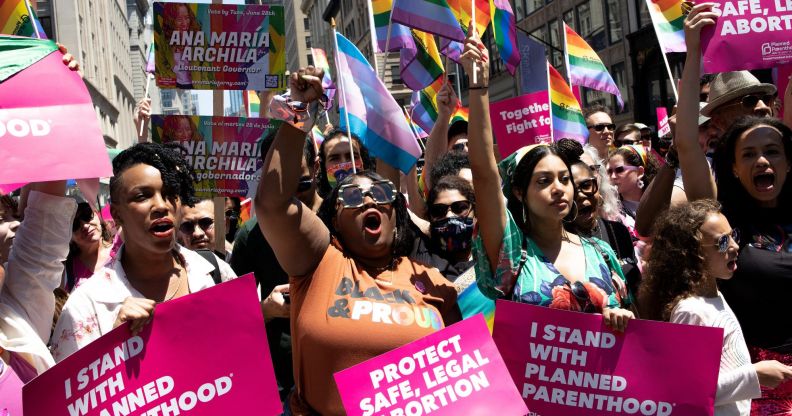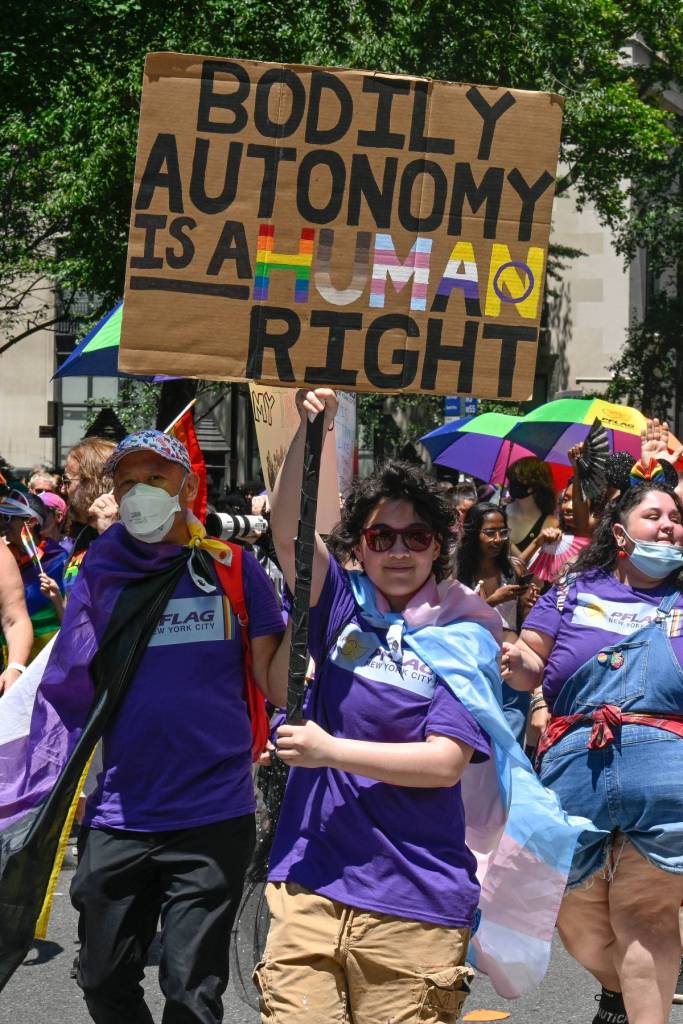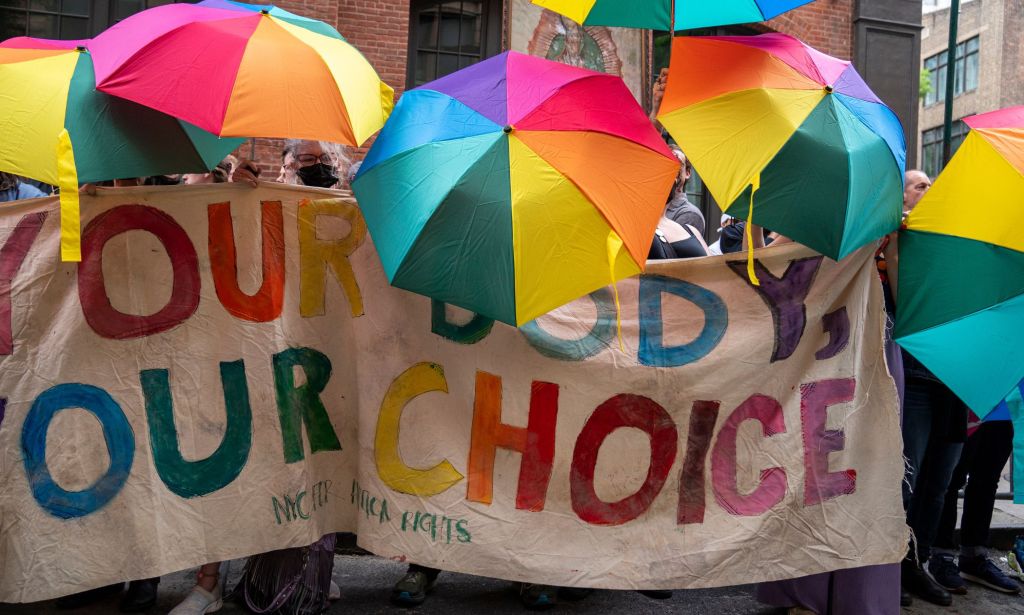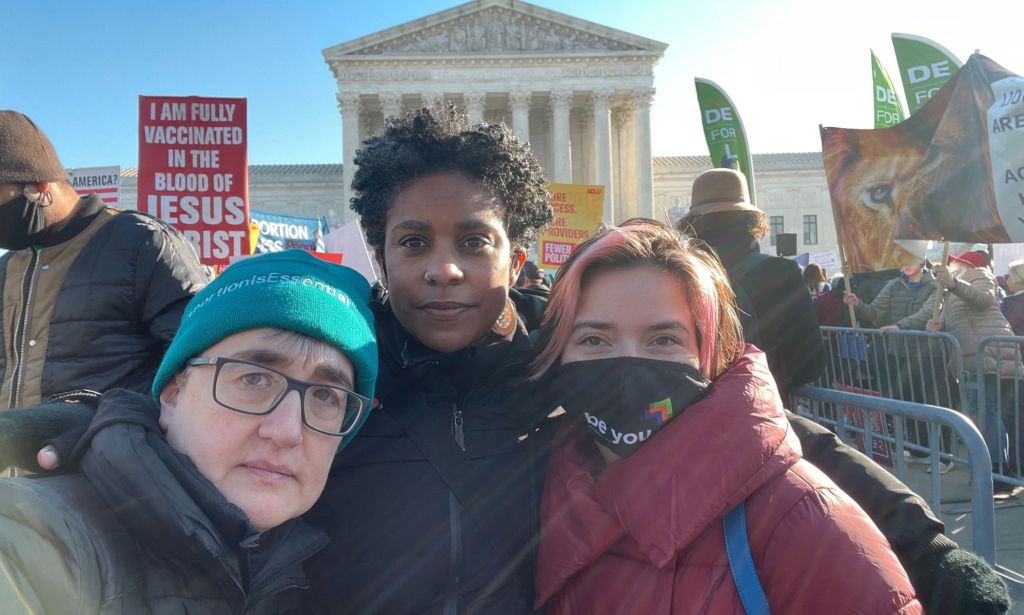Trans-led group helps people get safe abortions one year on from Roe v Wade ruling

The Supreme Court overturned Roe v Wade in June 2022. The decision had a monumental impact on people living in states with near-total abortion bans as a result. (Getty)
The Supreme Court overturning Roe v Wade in 2022 gave the power to each state to decide on abortion rights, and left many queer and trans people unable to access care at all.
Almost a decade ago, Oliver Hall had a self-managed abortion when they were 19 years old in Kentucky. The term refers to where a person takes abortion medicines without supervision, something the World Health Organisation says is safe in the first 12 weeks of pregnancy.
It felt “isolating” because Oliver was, at the time, navigating their gender and sexuality. They didn’t know who they could talk to that would support them and understand their decisions.
“I was glad that I had the ability to self-manage, but it was physically taxing and I was really sad that I was experiencing that alone,” they tell PinkNews.
“I had already had really negative interactions with the healthcare system, especially regarding my gender presentation, so I wanted to do anything I could to avoid that.
“My concern was that I would be in a vulnerable position seeking medical care and be treated badly by clinic staff as a gender non-conforming person.”
As is the case for many others, finances were also a factor in Oliver’s decision to self-manage.
“At the time, I didn’t know about abortion funds, and I knew as a college student working a part-time job I couldn’t afford to pay for one on my own,” they explain.
“I know my mom would’ve helped if I asked, but she also didn’t have a lot of money and I didn’t want to burden her.”
Today, Oliver is the trans health director for the reproductive justice organisation Kentucky Health Justice Network (KHJN), which helps trans, non-binary and gender non-conforming people in the state access healthcare.
The KHJN also has a support fund to help any person trying to obtain an abortion with assistance including financial help, transportation, interpretation and more.
This support is crucial as abortion is nearly completely illegal in Kentucky under two harsh state laws: a so-called trigger law, which went into effect after the Supreme Court overturned Roe v Wade on 24 June, 2022, and a ban on most abortions after about six weeks of pregnancy, before most people know they’re pregnant.
For decades, Roe v Wade protected reproductive rights, but the Supreme Court’s decision triggered immense change.
Oliver says it’s been an “incredibly stressful time” since Roe v Wade was overturned. Their co-workers who run the KHJN abortion support fund as well as their hotline and transport volunteers have “continued to make sure Kentuckians have access to abortion” despite the bans.
“No one should have to leave the state of Kentucky to access legal abortion care, but that’s the situation we’re in,” they explain.
“That’s why it’s so critical to both meet folks’ immediate needs through direct care and mutual aid, while building our collective power to create conditions that reduce the barriers to abortion care.
“The year has flown by, mainly because the attacks haven’t stopped, but I think a lot of us by necessity have been much more connected to our communities.”

The loss of federal abortion protections galvanised an already strong movement for greater reproductive rights. After the Supreme Court decision, the ability to access abortion became dependent on the state people lived in.
Being denied safe access to abortion is affecting the lives of millions, from cisgender women to trans men and non-binary people.
Among the most vulnerable are those trans, non-binary and gender non-conforming people who, already facing discrimination in medical settings, are confronted with additional barriers which can be insurmountable for many.
Trans people are more likely to struggle with poverty and unemployment. Many lack the finances to cover the procedure, multiple medical appointments and the costs of travelling potentially hundreds of miles to another state to get an abortion.
Gestational limits also routinely affect trans people who may have limited funds and access to pregnancy tests, Oliver says, as well as those who “may have been misinformed about the risk of pregnancy” on hormone replacement therapy.

Additionally, Kentucky has parental involvement laws that are “extra prohibitive for trans youth who may be estranged from their parents”, and ultrasound requirements can be “extra traumatic” for those who “may not feel a connection to that bodily process”.
“In Kentucky, before you even consider the effect anti-trans rhetoric has had on comfortability seeking care, a large portion of our community is unable to access care at all,” Oliver says.
“For trans youth, there is currently an outright ban on gender-affirming care, and for trans folks in more rural areas, they have to travel incredibly long distances to access care.”
Beyond that, Oliver says, anti-trans laws and rhetoric in Kentucky are discouraging healthcare providers from coming to the state, and encourage existing providers.
‘This is not just about reproductive rights or trans rights’
Cathy Renna, director of communications of the National LGBTQ Task Force, says the Supreme Court decision was a “watershed moment” for people to “really connect the dots” between the ruling and the surge in legislation attacking the LGBTQ+ community.
In his concurring opinion to the ruling on Roe v Wade, justice Clarence Thomas suggested the conservative-controlled court may return to the issues of same-sex marriage, contraception access and consensual same-sex sexual activity.

Thomas’ argument set off alarm bells among advocates for LGBTQ+ and reproductive rights. In December 2022, President Joe Biden signed the Respect for Marriage Act into law which codified same-sex and interracial marriage into US law by repealing provisions that define marriage as a man and a woman.
“If they’re telegraphing that marriage might be at risk, well gee, maybe the reasoning behind this is not that disconnected, right?” she says.
“Let me tell you this, when we were in front of the Supreme Court, the folks that were protesting and wanted to overturn Roe v Wade are the same groups that are coming after the queer community.
“It’s no accident that Concerned Women for America, the Family Research Council and the Alliance Defending Freedom, all of those folks are the same folks that are coming for us and are behind all of the anti-trans legislation that’s now happening and supporting it and funding it.”
Renna says the Supreme Court overturning Roe v Wade should be a wake-up call to others to “pull back the lens and look at the big picture” on how the conservative movement to roll back reproductive and LGBTQ+ rights is linked to a broader attack on “democracy”.
“This is not just about reproductive rights. It’s not just about trans rights. It’s not just about LGBT rights or women’s rights,” Renna says.
“It’s about democracy. It’s about the very fabric of the democracy that we have in this country being pulled to shreds by folks who want to take us back to a time when a lot of us were not safe at all.”

